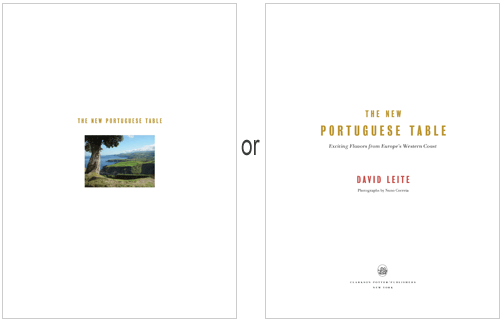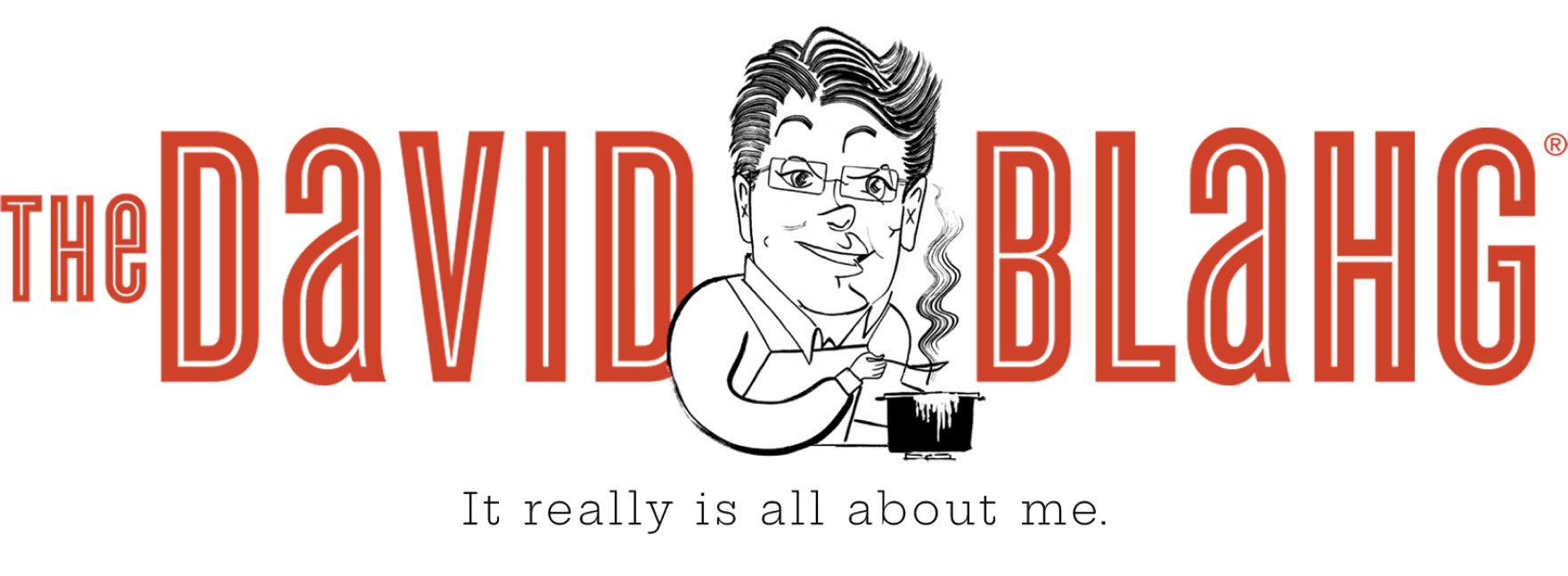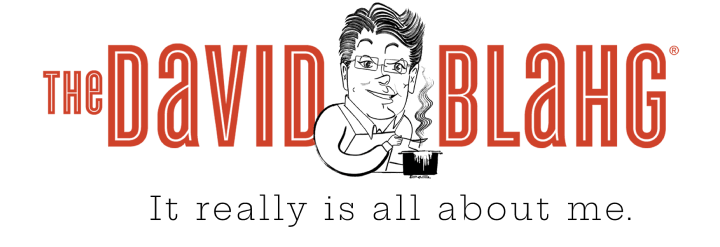
After Clarkson Potter approached me several years ago to write The New Portuguese Table (yes, publishers do approach writers unbidden, so don’t give up hope), I remember running around the apartment screaming and suddenly slamming into the side of an opened closet door. No matter, this was Clarkson Potter, home to some of my favorite authors. Facial bruises disappear, but colophons are forever.
But that T-bone collision with the door turned out to be just the beginning of my own personal Lemony Snicket’s Series of Unfortunate Events that, at times, made me almost throw up my hands, return my advance, and become a dog walker. At least I knew how to handle that kind of crap.
Some highlights:
- a.) a string of miscommunications, which, in the end, left me with only about six months to write the entire book;
- b.) astronomically high currency exchange rates while I lived in Lisbon, thank you Mr. Bush, leading me to blow through the equivalent of the annual budget of a small Eastern European country;
- c.) a severed Achilles tendon that landed me in bed and on the couch for three months after reconstructive surgery;
- d.) kitchen disasters from an oven that up and died to testing grilling recipes in the middle of a snow storm;
- e.) midnight panic attacks, worrying that something I wrote was incorrect, prompting eye-drooping sessions at the dining room table as I riffled through pages of my notes and reference books, the sun rising out the window;
- and f.) most outlandish, a cookbook author, whom I’ve never met, telling slanderous things about me to anyone who would listen, including the utterly ridiculous claim that I’m not Portuguese because I pronounce my last name leet instead of the Portuguese way: late. (Among my family and friends, this author is known as Lady Beelzebub, for all the obvious reasons.)
But a few weeks ago when I held an advance copy of the book in my hands, all of that slipped away. Looking at Stephanie Huntwork’s book design and Nuno Correia‘s food photography and reading though the recipes made it worth it. About a week later, at a private event, Ina Garten flipped through the book and said to me, “It’s beautiful. Remember, there’s nothing like seeing your first book for the first time.”
From now on, I thought, everything would be all right. Even Ina told me so (kind of).
And everything did go well. That was until I decided to give a copy of the book to one of my longtime supporters and closest confidantes, editor and writer Renee Schettler. We were meeting at our “office,” Starbucks on Broadway and 75th Street. I wanted to surprise her with one of the few copies I had. At the very last minute—with apartment keys in hand and book in backpack—I decided to sign it to for her. I opened the book, pulled out my gorgeous Waterman pen, a gift from a friend, and promptly choked. Where the hell do authors sign a book? My contract from Random House sliced and diced everything I was obligated to do during the course of writing and selling of the book, but stopped short of spelling out how to personalize it. Two pages seemed like good candidates: the half title page (seen above left) and the title page (seen above right). But how to choose. Criminy.
I flew to the bookcase and started flipping through all the cookbooks I had, trying to remember who signed copies for me. Dorie Greenspan autographed a copy of Paris Sweets, but that was in Connecticut. Did Lynne Rossetto Kasper sign a copy of The Splendid Table? Yes! No! Damn! To make space for all my Portuguese research, the book was placed in our storage unit in the building, along with Jacques Torres’ A Year in Chocolate and Shirley Corriher’s Cookwise. Wait! Hillary Clinton signed a copy of An Invitation to the White House. I flipped open the book. Finally. She signed it on the title page. If it was good enough for Hillary, it was good enough for me.
Ready to sign my very first book for my very first reader, I dutifully doodled on a piece of paper to make sure the ink was flowing and even practiced exactly what I was going to write to Renee. Then I turned the book at a perfect 45-degree angle, place my pen just beneath my name, and wrote:
To Renne—
Oh God, oh God, oh God. I spelled her name wrong. I’m so used to typing that when I write longhand my hand has a mind of its own. Blame it on spellcheck; if I’m tired or rushed I don’t even try to spell words correctly. A sentecne like thos get transpsoded with speall chek to a besauty like this: A sentence like this gets transposed with spellcheck into a beauty like this. On top of that, I write longhand so rarely that it sometimes feels as if I have a claw—without an opposable digit—at the end of my arm. So atrophied is it, that the signals from my brain won’t even jump synapses to make it work. The neurotransmitters, that no-good lazy bunch, just sit on one side of the synaptic divide, waiting for some kind of nerve ferry.
Apparently, I need physical therapy just to write my name.
I was already ten minutes late, and I had the rest of the inscription to write. I contemplated tossing the book and starting over, but that one misplaced “n” would cost me close to $17. I carefully turned it into an “e,” then I pulled out a manila mailing envelope and practiced on the back. Over and over again. I finally wrote the rest of the inscription in the book, without incident. As I handed the book to Renee, who seemed touched as she read what I wrote, I was inflating with shame at my imperfection and blurted out: “I MISSPELLED YOUR NAME.” Understanding as always, she just smiled. “It makes it all the more special.”
A few times a week now, I fill one side of an 8 1/2-by-11-inch sheet of paper with writing. Sometimes I copy the back of the cable bill, sometimes a recipe, sometimes an email telling me I’ve won $10 million in the Irish lottery. This, too, will be worth it. After all, I wouldn’t want my name to look as if I spelled it David Leet, would I?












Hi David,
It feels strange to “autograph” a book, like you’re a phoney or a poseur. I still haven’t gotten used to it, but it always gives me a thrill.
Some authors come up with a saying. Check your signed copies for examples. Ex. Fran Gage wrote “Here’s your chance to perfect your chocolate skills” when she signed Chocolate Obsession for me. If you’re afraid you’ll be nervous, it’s not a bad idea.
Go for the page with the photo. It gives you more room than writing all over your cover page. I use Sharpie pens. Make sure you have a stash, because you might lose a few in the excitement.
I went to Amazon yesterday and saw that the release date is August 18. I’m looking forward to my own personally autographed copy, too.
I’m so proud of you, David, for all the work that led to this moment. In the next few weeks you’re going to have the time of your life. Soak up all the attention and bask. You’ve earned it.
XOXO,
Dianne
Thanks, Dianne. It does feel weird, but I guess you get used to it. It’s strange to feel all this pressure to write the right, meaningful thing. I know some authors have a “name-only” rule. No matter how long you wait in line, all you get is their John Hancock. Definitely looking forward to the next few weeks. Yikes!
David, I just can’t wait for your book to come out. Having now been in America longer than in Portugal, the need to feel connected to my country’s traditions is stronger and stronger. I’m so excited I’ve promised a copy of your book to each one of my American friends. And, by the way, I’m keeping my fingers crossed and hope that you included a recipe for “Pasteis de Nata”, WITH the secret techniques from the Pastelaria de Belem! Yes?
Lina, I do have a recipe for pastéis de nata in the book, but, alas, on my trips to the Confeitaria de Belém, I was never let in on the secrets. But even though the book is finished, I’m still working on certain recipes (Julia Child did this, I discovered.) Pastéis de nata and piri-piri sauce being the two recipes that are ever-changing and restless.
David, excellent as usual. Having seen an advance copy of your book, your efforts were well worth it—and if Ina says it, it is true.
I can’t wait for my Amazon copy to arrive. I’m sure you’ll have the personalization perfected by the next time I see you. Best, David.
David, I know I better have the personalization down pat—you’ll accept no less. But I won’t sign it until I’m sitting with a cocktail in hand overlooking Lake Tupper or Tupper Lake, or wherever it is you live.